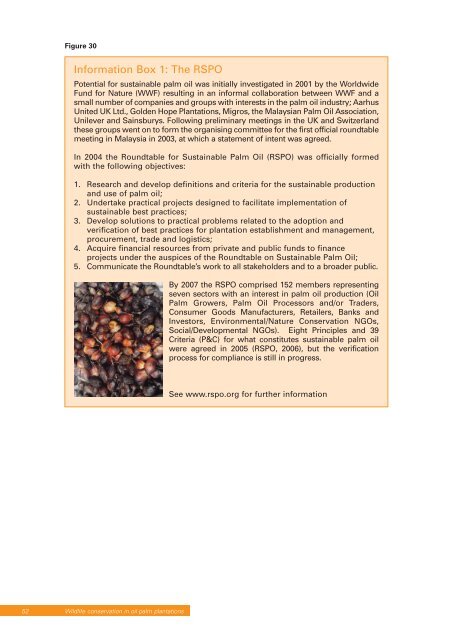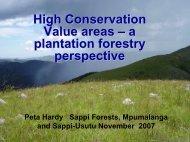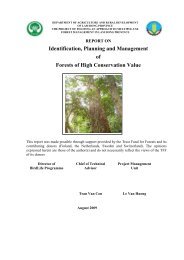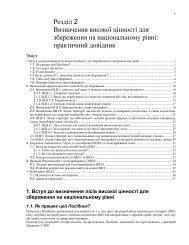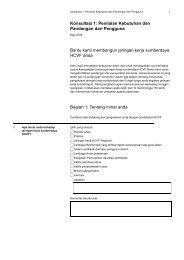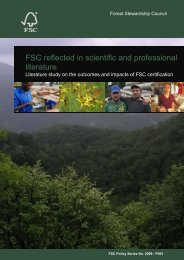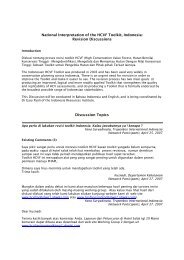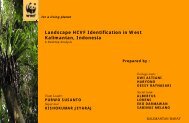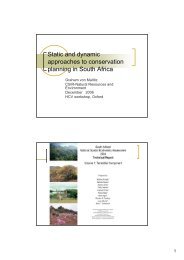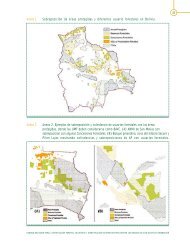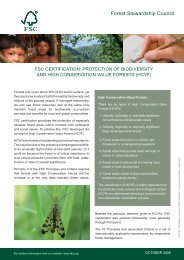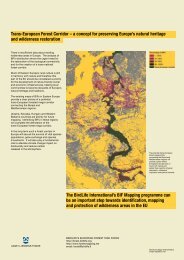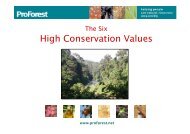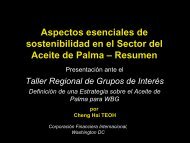The conservation of tigers and other wildlife in oil palm plantations
The conservation of tigers and other wildlife in oil palm plantations
The conservation of tigers and other wildlife in oil palm plantations
You also want an ePaper? Increase the reach of your titles
YUMPU automatically turns print PDFs into web optimized ePapers that Google loves.
Figure 30<br />
Information Box 1: <strong>The</strong> RSPO<br />
Potential for susta<strong>in</strong>able <strong>palm</strong> <strong>oil</strong> was <strong>in</strong>itially <strong>in</strong>vestigated <strong>in</strong> 2001 by the Worldwide<br />
Fund for Nature (WWF) result<strong>in</strong>g <strong>in</strong> an <strong>in</strong>formal collaboration between WWF <strong>and</strong> a<br />
small number <strong>of</strong> companies <strong>and</strong> groups with <strong>in</strong>terests <strong>in</strong> the <strong>palm</strong> <strong>oil</strong> <strong>in</strong>dustry; Aarhus<br />
United UK Ltd., Golden Hope Plantations, Migros, the Malaysian Palm Oil Association,<br />
Unilever <strong>and</strong> Sa<strong>in</strong>sburys. Follow<strong>in</strong>g prelim<strong>in</strong>ary meet<strong>in</strong>gs <strong>in</strong> the UK <strong>and</strong> Switzerl<strong>and</strong><br />
these groups went on to form the organis<strong>in</strong>g committee for the first <strong>of</strong>ficial roundtable<br />
meet<strong>in</strong>g <strong>in</strong> Malaysia <strong>in</strong> 2003, at which a statement <strong>of</strong> <strong>in</strong>tent was agreed.<br />
In 2004 the Roundtable for Susta<strong>in</strong>able Palm Oil (RSPO) was <strong>of</strong>ficially formed<br />
with the follow<strong>in</strong>g objectives:<br />
1. Research <strong>and</strong> develop def<strong>in</strong>itions <strong>and</strong> criteria for the susta<strong>in</strong>able production<br />
<strong>and</strong> use <strong>of</strong> <strong>palm</strong> <strong>oil</strong>;<br />
2. Undertake practical projects designed to facilitate implementation <strong>of</strong><br />
susta<strong>in</strong>able best practices;<br />
3. Develop solutions to practical problems related to the adoption <strong>and</strong><br />
verification <strong>of</strong> best practices for plantation establishment <strong>and</strong> management,<br />
procurement, trade <strong>and</strong> logistics;<br />
4. Acquire f<strong>in</strong>ancial resources from private <strong>and</strong> public funds to f<strong>in</strong>ance<br />
projects under the auspices <strong>of</strong> the Roundtable on Susta<strong>in</strong>able Palm Oil;<br />
5. Communicate the Roundtable’s work to all stakeholders <strong>and</strong> to a broader public.<br />
By 2007 the RSPO comprised 152 members represent<strong>in</strong>g<br />
seven sectors with an <strong>in</strong>terest <strong>in</strong> <strong>palm</strong> <strong>oil</strong> production (Oil<br />
Palm Growers, Palm Oil Processors <strong>and</strong>/or Traders,<br />
Consumer Goods Manufacturers, Retailers, Banks <strong>and</strong><br />
Investors, Environmental/Nature Conservation NGOs,<br />
Social/Developmental NGOs). Eight Pr<strong>in</strong>ciples <strong>and</strong> 39<br />
Criteria (P&C) for what constitutes susta<strong>in</strong>able <strong>palm</strong> <strong>oil</strong><br />
were agreed <strong>in</strong> 2005 (RSPO, 2006), but the verification<br />
process for compliance is still <strong>in</strong> progress.<br />
See www.rspo.org for further <strong>in</strong>formation<br />
52 Wildlife <strong>conservation</strong> <strong>in</strong> <strong>oil</strong> <strong>palm</strong> <strong>plantations</strong>


